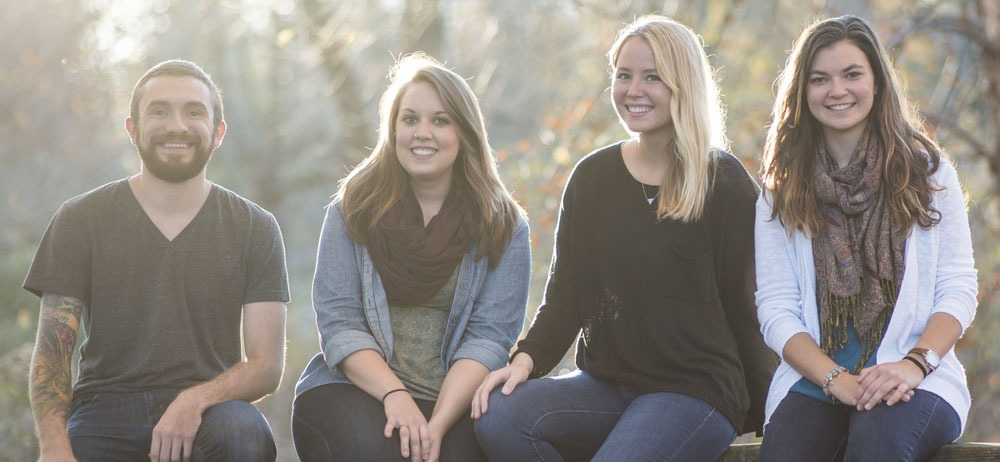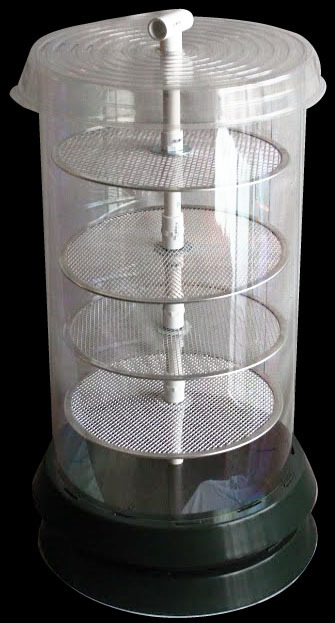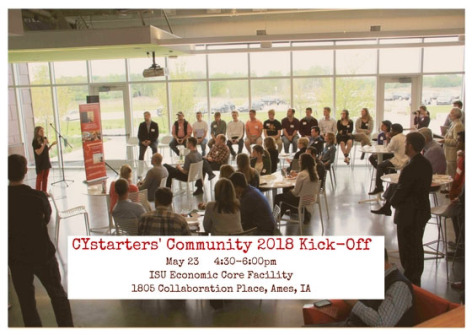This story is part of a series about CYstarters, Iowa State’s startup accelerator that helps students become entrepreneurs.

KinoSol founders (from left) Clayton Mooney, Elise Kendall, Ella Gehrke, Mikayla Sullivan Photos courtesy of Clayton Mooney
AMES, Iowa – Clayton Mooney credits the success of startup company KinoSol in part to a piece of advice from a CYstarters mentor. Mooney says it pushed him and his partners to improve their product.
The mentor was John Pappajohn. His advice – lower your price point. For a startup, which at the time was commandeering family workshops and garages to build its solar-powered food dehydrators, it was a tall order. But Mooney and the KinoSol team took Pappajohn’s words to heart. They sold their first dehydrator for around $250. Now the units sell for just under $100.
“We kept working away and drastically reduced our prices by switching to different materials,” Mooney said. “That was a big takeaway. I don’t think we could have made that connection and developed that partnership without CYstarters.”
KinoSol was selected for the first CYstarters cohort in 2016. The 10-week summer accelerator program provides Iowa State University students and recent graduates with funding and resources to grow their startups. The KinoSol team had already developed a prototype – and refined it five times – but CYstarters made the process of finding better materials and suppliers more efficient, Mooney said.
The open, candid feedback from mentors was invaluable and what Mooney aims to provide for startups in this summer’s cohort. Returning to CYstarters as a mentor is a way for Mooney, a 2012 alumnus who also works for Iowa State’s Agricultural Entrepreneurship Initiative, to give back for the support he received as a student.
CYstarters has a network of 60 to 70 mentors who attend weekly accountability sessions and participate in panel discussions. Mooney knows the advice is not always what young entrepreneurs want to hear, but need to hear.
“I know the value of having another entrepreneur provide that candid feedback, and motivate you when you run into a problem that you don’t know how to work around,” Mooney said. “It’s very refreshing to have someone say, ‘Everyone goes through that and here’s how we solved it.’”
Best time to start a business

KinoSol produces solar-powered food dehydrators
Mentors provide guidance and a level of accountability to ensure the startups – all at different levels of development – progress and stay on track. It is not only important for entrepreneurs to build a network through weekly meetings with their mentors, but to also get out into the community, said Judi Eyles, director of the Pappajohn Center for Entrepreneurship, which coordinates CYstarters.
“Students put their heart and soul into their startups, but they need to be talking with customers and other business owners to see if it is a viable product or service,” Eyles said. “This type of feedback helps students determine if it makes sense to move forward with, redefine or abandon the concept.”
Ideally, each startup would lead to a successful business launch, but that is not reality. Mooney, often described as a serial entrepreneur, has been part of multiple ventures, some that “really crashed and burned,” but he says that is the advantage of starting a business as a college student. CYstarters is just one of several opportunities for students to explore entrepreneurship.
“Best time to start a business is in college. Take advantage of all the campus resources. As a student, you have access to business plan competitions, mentors, advisers, potential business partners and ways to prototype potential products,” Mooney said. “There are so many campus resources that there are very few excuses for not moving a business idea forward.”
Contacts
Clayton Mooney, Agricultural Entrepreneurship Initiative, cdmooney@iastate.edu, 641-201-0651
Judi Eyles, Pappajohn Center for Entrepreneurship, eyles@iastate.edu, 515-296-6754
Angie Hunt, News Service, amhunt@iastate.edu, 515-294-8986
Quick look
Clayton Mooney credits the success of startup company KinoSol in part to a piece of advice from a CYstarters mentor. Mooney says it pushed him and his partners to improve their product. CYstarters mentors provide guidance and a level of accountability to ensure the startups – all at different levels of development – progress and stay on track.
Quote
“I know the value of having another entrepreneur provide that candid feedback, and motivate you when you run into a problem that you don’t know how to work around. It’s very refreshing to have someone say, ‘Everyone goes through that and here’s how we solved it.’”
Clayton Mooney, CYstarters alum and mentor
Be a mentor
CYstarters is always looking for mentors to work with young entrepreneurs in the program. If you're interested in being a mentor, you can sign up here.
The CYstarters' Community 2018 Kick-off is Wednesday, May 23. Learn about the 10-week accelerator program and meet this summer's cohort of startups. You can find more information here.
